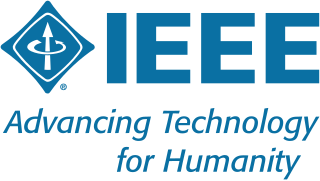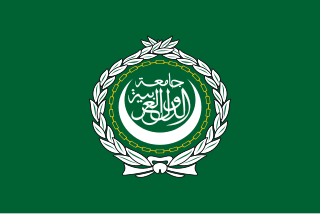The United Nations Iraq–Kuwait Observation Mission (UNIKOM) was established on April 9, 1991 following the Gulf War by Security Council Resolution 689 (1991) and fully deployed by early May 1991.

The Institute of Electrical and Electronics Engineers (IEEE) is a professional association for electronic engineering and electrical engineering with its corporate office in New York City and its operations center in Piscataway, New Jersey. It was formed in 1963 from the amalgamation of the American Institute of Electrical Engineers and the Institute of Radio Engineers.
The Committee on the Exercise of the Inalienable Rights of the Palestinian People (CEIRPP) was founded on 10 November 1975 by Resolution 3376 of the United Nations General Assembly in order to formulate a programme to enable the Palestinian people to exercise their inalienable right to self-determination, to national independence and sovereignty, and the right of Palestine refugees to return.

The President of the United Nations General Assembly is a position voted for by representatives in the United Nations General Assembly (UNGA) on a yearly basis. The President presides over the sessions of the General Assembly.
Simon Ramo was an American engineer, businessman, and author. He led development of microwave and missile technology and is sometimes known as the father of the intercontinental ballistic missile (ICBM). He also developed General Electric's electron microscope. He played prominent roles in the formation of two Fortune 500 companies, Ramo-Wooldridge and Bunker-Ramo.
The Intergovernmental Group of Twenty-Four on International Monetary Affairs and Development, or The Group of 24 (G-24) was established in 1971 as a chapter of the Group of 77 in order to help coordinate the positions of developing countries on international monetary and development finance issues, as well as and to ensure that their interests are adequately represented in negotiations on international monetary matters. Though originally named after the number of founding Member States, it now has 28 Members. Although the G-24 officially has 28 member countries, any member of the G-77 can join discussions.

The G20 is an international forum for the governments and central bank governors from 19 countries and the European Union (EU). Founded in 1999 with the aim to discuss policy pertaining to the promotion of international financial stability, the G20 has expanded its agenda since 2008 and heads of government or heads of state, as well as finance ministers and foreign ministers, have periodically conferred at summits ever since. It seeks to address issues that go beyond the responsibilities of any one organization.

Alejandro Padilla is an American politician, Democratic Party activist, engineer, and civil servant. He has served as the Secretary of State of California since winning the general election on November 5, 2014, defeating Republican Pete Peterson, with approximately 54% of the vote.
The National Academy of Engineering (NAE) is an American nonprofit, non-governmental organization. The National Academy of Engineering is part of the National Academies of Sciences, Engineering, and Medicine, along with the National Academy of Sciences (NAS), the National Academy of Medicine, and the National Research Council.

The United Arab Emirates Football Association is the governing body of football in the United Arab Emirates. The senior football national team made one World Cup appearance, in 1990 in Italy, won the Gulf Cup in 2007 and the Gulf Cup in 2013, the youth national team claimed the AFC U-19 Cup in 2008.
The Board of Governors of the International Atomic Energy Agency (IAEA) is one of the two policy making bodies of the IAEA, along with the annual General Conference of IAEA members.

Adefemi Kila is a Nigerian politician and engineer who served in the Senate, representing Ekiti Central in April 2007 just after working for Julius Berger Nigerian Plc for 30 years as a civil engineer and as a technical manager (administration) for 18 years. He is currently a council member of Standards Organisation of Nigeria SON. He is a devoted Christian of the Anglican church of Nigeria.

The Economic and Social Council of the Arab League is an institution of the Arab League that co-ordinates its economic integration. The ESC was established as the Economic Council under the terms of the Joint Defence and Economic Co-operation Treaty (1950). and held its first meeting in 1953. In 1957, the ESC established the Council of Arab Economic Unity (CAEU) and, in February 1997, the ESC adopted the Agreement to Facilitate and Develop Trade Among Arab Countries (1981) in pursuit of the Greater Arab Free Trade Area (GAFTA).

The Sixty-sixth Session of the United Nations General Assembly opened on 13 September 2011 at 15:00 and was presided over by former Qatari permanent representative to the UN Nassir Abdulaziz Al-Nasser. The session ended on 18 September as al-Nasser symbolically passed the gavel to the president of the next session, Vuk Jeremic.
Zou Jiahua is a retired high-ranking politician of the People's Republic of China. He served as China's Vice Premier from 1991 to 1998, Vice-Chairman of the 9th National People's Congress from 1998 to 2003, and was a member of the Politburo of the Communist Party of China from 1992 to 1997.

The Sixty-seventh session of the United Nations General Assembly opened on 18 September 2012 and having its last scheduled meeting on 11 September 2013. The President of the United Nations General Assembly was chosen from the EEG with Serbia's then foreign minister Vuk Jeremić beating out Lithuania's Dalius Čekuolis in an election. Notably, the session led to United Nations General Assembly resolution 67/19 which granted Palestine non-member observer state status.

The 1975 United Nations Security Council election was held on between 20 October and 23 October 1975 during the Thirtieth session of the United Nations General Assembly, held at United Nations Headquarters in New York City. The General Assembly elected Dahomey, Libya, Pakistan, Panama, and Romania, as the five new non-permanent members of the UN Security Council for two-year mandates commencing on 1 January 1976. Benin and Libya were elected for the first time.
Ye Peida was a Chinese telecommunications engineer and educator. He was a founding professor of the Beijing Institute of Posts and Telecommunications in 1955 and served as its president in the 1980s. He was an academician of the Chinese Academy of Sciences and a Life Fellow of the Institute of Electrical and Electronics Engineers (IEEE). He was awarded the Ho Leung Ho Lee Prize for Technological Sciences and the Third Millennium Medal of IEEE.
Ye Zhupei or Yap Chu-Phay was a Chinese physical chemist, chemical engineer, and metallurgist. Born into an overseas Chinese family in the Philippines and educated in the United States, he moved to China in the 1930s and served in both the Kuomintang and the Communist governments. Considered the founder of chemical metallurgy in China, he was elected a founding member of the Chinese Academy of Sciences (CAS) in 1955 and established the Institute of Chemical Metallurgy of the CAS in 1958. He was persecuted during the Cultural Revolution and died in prison after five years of incarceration.

The Seventy-fourth session of the United Nations General Assembly is the current session of the United Nations General Assembly which was opened on 17 of September 2019 and will run until 16 September 2020












